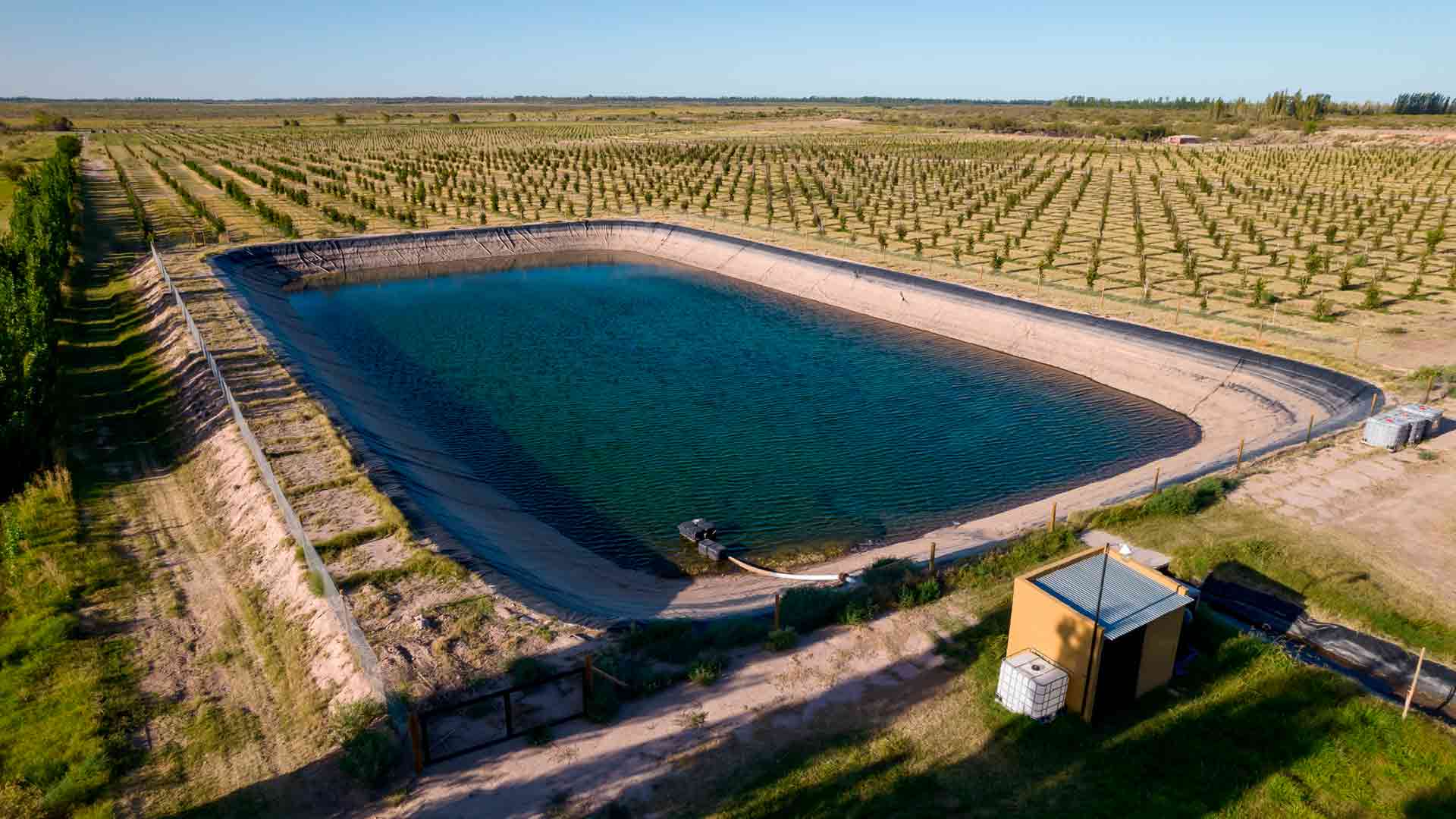- Sectors
- Aerospace & Defense
- Big science
- Fintech
- Insights

Water is an essential resource in agriculture and a fundamental component for the growth and development of crops. So much so that currently in Spain 38% of the country’s water resources are used for irrigation.
Currently, for the treatment of water used for irrigation, even in organic farming, chemicals such as potassium permanganate are used, which slows down plant growth.
From ARQUIMEA Agrotech we worked on the development of a natural and biodegradable product capable of eliminating and preventing algae growing in irrigation ponds in a sustainable way. This is how BIO100 was born, a biological algaecide 100% biodegradable and innocuous for crops and agricultural soils.
38%
Irrigation water resources
3,7M
Hectares of irrigated land
28º
Spain’s ranking among the most water-stressed countries in the world
The presence of algae in irrigation ponds can lead to problems such as decreased oxygen concentration in the water, changes in pH or clogging of irrigation systems, which has a negative impact on irrigation efficiency. In addition, applying poor quality water to crops causes an alteration in germination and plant growth.
Therefore, effective management of algae growth in irrigation ponds becomes a critical component to ensure the continuity of agricultural production and the preservation of agricultural soils.
However, currently the most common treatment in irrigation ponds is the application of potassium permanganate. A very common chemical in water treatment that forces farmers to wait 30 days before being able to use this water on their crops. Its components seriously affect plant germination and growth and although, after 30 days, its concentration in the water is very small, its application slows plant growth.
Therefore, the great challenge is to find an algaecide capable of quickly eliminating algae from irrigation ponds. On the one hand, without having to wait 30 days to use the water and, on the other hand, without affecting plant germination or growth or agricultural soils. In conclusion, irrigation water treatment is much more sustainable and profitable for the farmer.
BIO100 is developed from microbial consortia and a sunscreen, which in combination acts as a biostatic. That is, it does not destroy the algae, but stops their growth and development. The bacteria ‘rapture’ the food on which the algae feed and the sunscreen hinders algae photosynthesis. Thanks to this two-in-one effect, the sunscreen acts when the bacteria do not, making it more effective.
As it is a completely natural product, its use on the plant does not affect plant growth or interfere with the germination process. On the contrary, the microorganisms improve the quality of the soil, acting as a nutrient facilitator for the plant.
Thanks to all this, a pond of water treated with BIO100 can be used on the crop practically from the day after its application without affecting the plant or the quality of the soil.
Llevamos a cabo la aplicación de BIO100 en una balsa de 9.000m3 (3.000m2) localizada en la región de Murcia durante la época estival, en la cual se produce una mayor proliferación de algas debido a las condiciones climáticas.
La balsa presentaba crecimientos de algas que fueron desapareciendo tras la aplicación de BIO100. Tras 30 días de aplicación, la balsa mantenía la coloración azulada y el crecimiento de algas era mínimo, en comparación con balsas tratadas con productos químicos durante la época estival, a pesar de las condiciones climáticas propicias para el crecimiento de algas. Además, los parámetros de pH, conductividad eléctrica, TDS y OD se mantenían óptimos para la aplicación de agua a cultivo.
Se mantuvo el tratamiento periódico cada 30 días durante el otoño e invierno, y se corroboró la ausencia de crecimiento de algas a lo largo del tiempo, manteniendo las condiciones óptimas del agua para su aplicación en cultivo durante todo el proceso.
Irrigation pond in Cuenca
The second case of success was found in Cuenca, where we applied BIO100 in two new ponds. The first one, which we called ‘Well pond’, had a surface area of 2000m2 and a total capacity of 6000m3. The second ‘Secondary pond’ had a total capacity of 8000m3 with a surface area of 2700m2.
In this case, treatment was initiated during the late summer and early autumn. It was observed that no algae growth occurred, and also the optimal water quality parameters for its application in cultivation were maintained.
The treatment was continued during the spring, when algae began to emerge. It was observed that, at the beginning of the mobilization of water for cultivation, the blue coloration of the ponds decreased, but the absence of algae growth and water quality was maintained.
During the summer season, periodic treatment was maintained every 30 days, so that the bluish coloration persisted, as well as the absence of algae and the maintenance of water quality parameters for agricultural application.